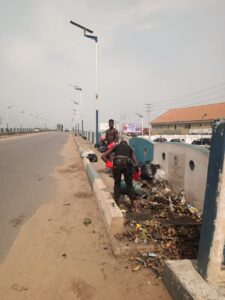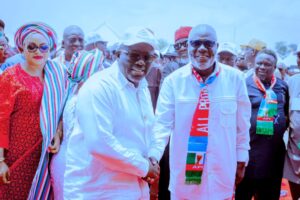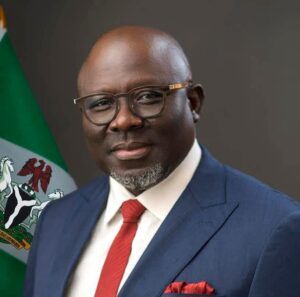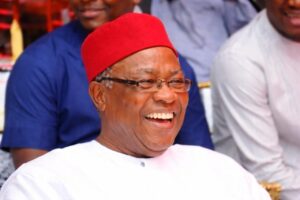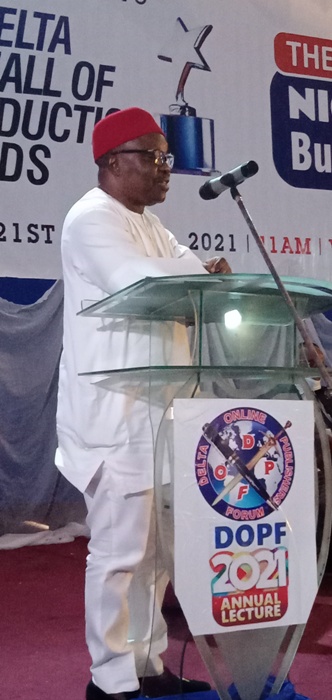
Dr Emmanuel Uduaghan presenting the lecture during the event
By Jon Egie
Immediate past governor of Delta State, Dr Emmanuel Uduaghan has given reasons why the Niger Delta region wears a violent face and suggested what to be done to delist the region from the category of being globally recognized risk zone as enunciated in the recent released travel risk advisory by the United Kingdom to British citizens.
Uduaghan speaking as Guest Speaker during the Delta Online Publishers’ Forum (DOPF) 2021 annual lecture held at the Orchids Hotel, Asaba; Thursday, October 21, on the theme, “Niger Delta Economy: Building a New Face for the Region”, said the old face of the Niger Delta region is that of violence and hence, the embassies of the United States and United Kingdom have considered the area a red zone in their assessment and travel advisory to their citizens.
Agreeing with the assessment and categorization of the region as a risk zone, Dr Uduaghan said the region has been so characterized for a very long time and there was no need to call press conferences to counter the advisory rather, the authorities in the region should do the needful to pull the region from that classification which deters foreign investors from coming to the area.
As an overview, Dr Uduaghan said the region is comprised of nine states namely: Abia, Akwa Ibom, Cros River, Delta, Edo, Imo, Ondo and Rivers, all of which have 185 local government areas. 90 per cent of theses states, he said, are oil producing and noted that any state in Nigeria outside those in the Niger Delta said to be oil producing is politically arranged.
The region he added, accounts for 24 per cent of the total population of Nigeria and thus, parades 31 million people, 62 per cent of whom are active youths of 30 years and below who are economically strangulated and oppressed by the prevailing federal government economic policies that have led to the violent face of the region.
Issues
He further noted that 85 per cent of the population of the Niger Delta region are engaged in informal enterprises as primary source of their livelihood which are characterized by low productivity and wages, pointing out that although there are many oil prospecting companies in the region, a majority of the workforce in such Multinational Oil Companies (MNOCs) are drawn from among ethnic groups outside the region and with their income returned to the home places of the workers.

According to him, leaders of the region have fought against the bare faced marginalization of indigenes of the region in that regard with insignificant results especially in the area of employment of youths of the region in the oil industry and in the fight to ensure that headquarters of the MNOCs are relocated to the areas of their operations in the Niger Delta region.
Recalling an experience where he had the opportunity to be a member of a panel that interviewed candidates for employment in Shell, Dr Uduaghan lamented that out of 120 candidates that were employed after the interview, only three were from the Niger Delta region and the others were from other ethnic groups outside the region. The simple explanation given for the skewed seemingly bright performance of the recruits was the fact that graduates from outside the Niger Delta region were posted to the region to do their national youth service in the oil companies which exposed them to the basic information required to pass the recruitment tests whereas, graduates from the Niger Delta region had no such opportunity and so, “because our people are not significantly involved in the oil business, we live on low wages.”
The activities of the oil exploiting companies, he added, has reduced the productivity of the farmlands of the people of the region because of pollution resulting from oil exploration activities and because, no state in the Niger Delta region has the financial and technical capacity to clean the pollute environment, foreign intervention is needed.
He said the region’s coastline is bounded by the Atlantic Ocean, extending from the mouth of Benin River to the Imo River Estuary and spans 500 km but the federal government claims to own the coastline even though he is aware that there can be no part of Nigeria that belongs to no one and hence, the region has gone to court to challenge the federal government’s claim on its coastline.
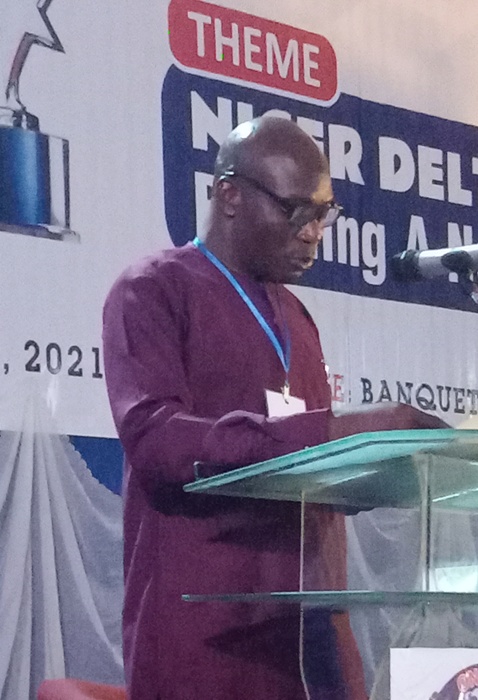
Given that Nigeria is the fourth largest Cocoa producer in the world and with the Niger Delta region producing 53 per cent of the country’s output; and also with Cross River, Edo and Ondo states accounting for 97 per cent of the region’s production capacity, he lamented that the major processing for Cocoa is in Western Nigeria, around Lagos, so major value addition takes place outside of the Niger Delta region and hence, called on the authorities to allow some of these industries come to the region; confessing however, that the attitude of the people, especially youths of the Niger Delta region was responsible for industries not coming to the region.
Dr Uduaghan alleged that youths of the region demand at least two hundred thousand naira from each ship approaching Niger Delta ports to berth as piloting fee because boys in the creeks know the navigable routes and this behavior has earned most of the ports in the Niger Delta region the disrepute of a red zone in the world map because of the risk of coming to the region. He appealed for a change of attitude stressing that the more ships came to the region the brighter the economic opportunities that would be opened to the region.
Raising the issue of the importance of sea ports as very key infrastructure that support and facilitate manufacturing process and business development, he observed that by indices of port productivity and performance, particularly ship traffic and tonnage of cargo handled per given period on aggregate, “the Niger Delta Seaports have performed sub-optimally due to low patronage and “for a new face of the region to be built, we need to move from insecurity to making the region a high economic investment hub.”
Making explanation on his administration mantra of Delta Beyond Oil, Dr Uduaghan said the concept goes beyond the life and span of his government and expected that having laid the foundation, subsequent administrations should build on the policy.
“The basis is that we have oil in the region and the money coming from oil should be used to build infrastructure that would support the economy of the states of the region. There is urgent need for the Niger Delta administrative states and the federal government to work in collaboration to ensuring that there are good road networks connecting states and communities.
“As seaports are globally acknowledged as development agents and growth drivers, it goes without saying that making the existing seaports in the region to function in their full capacities will only reverse their fortunes as sea-land interface structure but will once again, revive the once active but now dying market outpost which the ports of Warri, Sapele, Burutu, PorthHarcourt, Calabar and Onne were known for.”
Stressing that the internet does not forget, the former governor observed that there were too many rumours and lies especially on issues that have to do with the Niger Delta region and advised the media, particularly online publishers and writers to be sensible and responsible on such issues that would damage the image of the region.
Discourse
In a debate by panelists during the discussion session, Dr Ignatius Nwanze Ezeom, former provost of federal college of education (technical) Asaba, said oil proceeds from the Niger Delta region are sent to Abuja where governors of the region go cap in hand to beg and even the little they get, “what have they done with it?” He asked.
“If we must develop the economic base of the Niger Delta region, we must carry out an economic revolution, everybody check yourself, governors of the region should look at the natural resources available in their local communities and invest on them. We could export crabs to Singapore from Burutu and yam from Abavo. We must be practical and not continue on the path of theoreticians.”
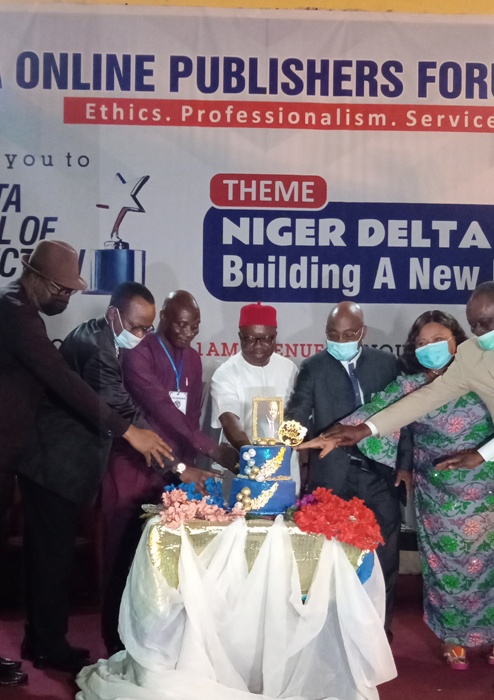
But Prof Patrick Muoboghare, Commissioner for higher education disagreed saying it was the responsibility of the private sector to make such investment while it is the obligation of government to secure the enabling environment for businesses to thrive and hence, called on the private sector to take advantage of the business opportunities available in states of the Niger Delta and harness the natural resources the region is endowed with.
Prof Muoboghare described as the height of irresponsibility for anyone to classify and tag Delta State as a red zone and risk area to access saying that the British government that did the arm-chair assessment had been involved in such frivolous assessment even at independence of the Nigeria.
For him, the federal government of Nigeria pushed the youths of the Niger Delta region to violence and the youths were only resisting the federal government economic policies of oppression and repression. One of such recent provoking action by the federal government, he noted, was the location of a naval base in Kano where there is no water, an aberration which he called on the federal government to correct without delay so that the Niger Delta region could enjoy that opportunity.
“Our people want to go to farm but Fulani herdsmen have taken over our forests, how can there be economic development in the face of no water, no land? And that is why everybody is looking at the federal government for help. Your land is your own but our water is not our own, off-shore oil is not our own but gold is your own” he fumed and described the Niger Delta region as the vanquished territory in spite of Yakubu Gowon’s declaration that there was no victor no vanquished in the Nigeria Civil War.
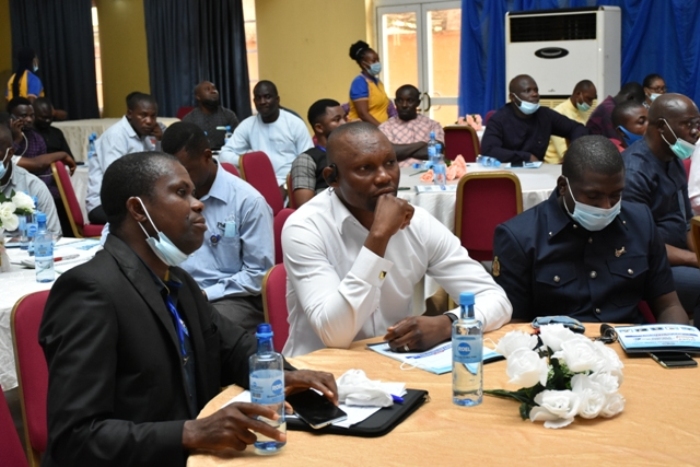
Prof Muoboghare invoked a curse that until the Nigeria government confesses and restitutes the sin that they committed against the people of the Niger Delta, “there will continue to be pandemonium among the oppressors of the region.”
Ms Annkio Briggs and Ms Faith Nwadishi also contributed to the discourse calling for implementation of past white papers on the development of the region.
Goodwill messages
Also speaking at the occasion, Goveror Ifeanyi Okowa who was represented by his Chief of Staff, Chief Festus Ovie Aga Esq, said resources were being channeled for the development of the state. The governor said his administration was building on the successes of past leaders in the state and commended Dr Emmanuel Uduaghan for his contribution to the development of the state saying Uduaghan’s policies and programmes were dear towards meeting aspirations of citizens of the state.
Okowa pointed out that security was the responsibility of the federal, state and local governments as well as traditional and religious leaders.
He charged the DOPF to ensure transparency, fairness and truth in their reportage as a panacea to the development of the region.
Deputy senate president, Senator Ovie Omo-Agege who was represented by Mr Joseph Adumabua said a new face for the Niger Delta region was inevitable. He noted that over the years lack of economic opportunities put many young men of the region into illegal and violent activities to create livelihood for themselves. He however assured that the federal government was investing on infrastructure for the region which include the Lagos-Kalabari rail line that will pass through Warri, PortHarcourt, Uyo to Calabar hoping that the project will attract private sector to boost the volume of trade and investment to give the region an identity.
Interim administrator of NDDC, Mr Effiong Akwa who was represented by the Commission’s Director of New Media, Mr Chijoke Amu-Nnadi called for a new master plan towards the development of the region saying that updating the development plan of the region would position the region for all round development.
Earlier, Chairman of DOPF, Mr Emmanuel Enebeli said the mission and vision of the forum is centered on ethics, professionalism and quality service and called for patronage .
Highlight of the occasion was the cutting of the birthday cake of former Gover Emmanuel Uduaghan who turned 67 on Friday, October 22 and the induction of Chief Government Oweide Ekpomupolo aka Tompolo into DOPF Hall of Fame.

